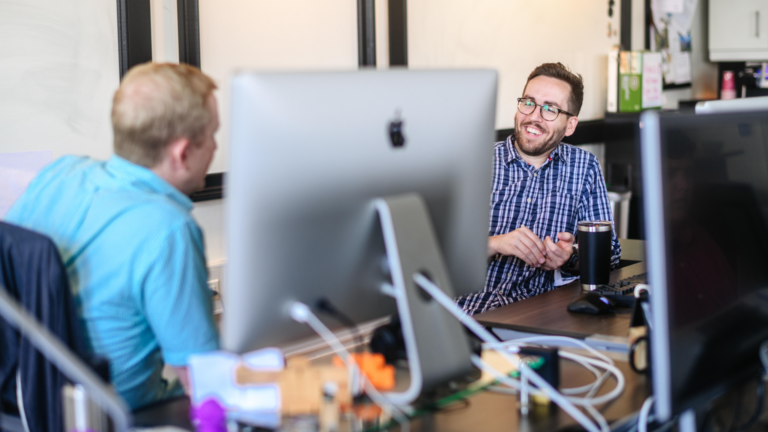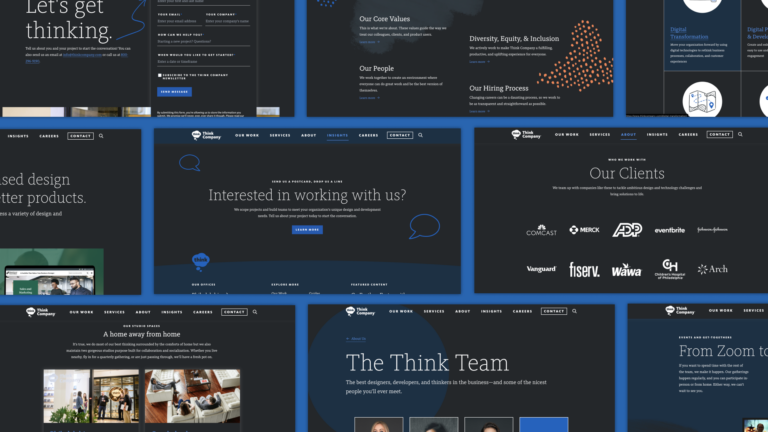by Amanda Kalk, Mandy Wehrman, Nicole Witte, Nish Arya, and Panayiotis Dimopoulos
Bootcamps have become one of the most popular ways for new engineers to enter the UX and technology field. Bootcamps are typically accelerated, immersive education programs that aim to help you move from a beginner to a job-ready developer. There are a ton of bootcamps available with different focus areas, cadences, and timing—making them an ideal way for many newcomers to earn industry credentials.
At Think Company, we have hired several UX Engineers who attended bootcamps. We often have conversations about what they did (and didn’t!) learn to both get a job and excel in their roles. The development team put together a more formal Q&A with a few of these Thinkers (Nicole Witte, Mandy Wehrman, Panayiotis Dimopolous, and Nish Arya) to better understand their take on the benefits and drawbacks of the bootcamps they attended. Below is a summary of some of the answers we heard.
Q&A: Thoughts and advice on attending coding bootcamps
Why did you choose to attend/teach a Bootcamp?
Bootcamps have been around for years but have seen a recent surge in attendees during the COVID-19 pandemic as many individuals hoped to jumpstart a career switch into development. On our team is a mix of career switchers and post-college bootcamp attendees who looked to build on small coding experiences that sparked their interest in development.
- “I took a computer science course freshman year and got a C in it. I loved the class but the professor was too smart to bring herself down to basic levels, so when I was struggling and needed help, I never really got it—and I did not continue to take any more computer science courses. I was about to graduate from college with an English degree and wasn’t excited by the prospect of potential jobs I’d been introduced to. My friend went to Ada Developers Academy right after school and shared that she loved it and that I should look into it, too. I started doing mini courses online during my senior year, graduated, and looked into programs to apply to for the fall. The first one I applied to accepted me. Additionally, they had an option to pay off the tuition after I secured a job in tech with a salary that was $40k or more.” – Nicole Witte
- “In my first semester of college, I was enrolled in a business information systems course, which was a prerequisite for the degree I was planning to get (Business Finances). I recognized that I enjoyed technology. My professor suggested that if I liked the subject, I should consider a minor in business information systems, and I did. During the rest of my college career, I took a handful of 100 and 200-level programming courses, including python and C++, and enjoyed them a lot. I started thinking about a career in the field. Upon graduation, I knew I had too much debt and couldn’t afford a master’s degree, and felt stuck. I stumbled upon App Academy’s advertisement offering engineering education at no cost until I was hired, and that sounded too good to be true initially. I did some research about bootcamps and found good things about App Academy. This is when I chose to go the bootcamp route.” – Nish Arya
- “During my time in college I had taken a few ‘technical’ courses—mainly in R and SQL for basic data analysis. I enjoyed solving data-related problems with technology and decided to pursue that as a career. Shortly after college I began working at a digital advertising firm creating reports on digital advertising analytics. I began to re-learn and use Python to automate some of my repetitive data tasks. I ended up really enjoying it and decided to learn more on my own. Some of my close friends who worked in software development recommended freecodecamp.org as a resource. From there, I stayed late in the office slowly teaching myself web development. After a few months, I decided to take the leap of faith and pursue development full-time via a bootcamp due to its cheaper cost and shorter timeline relative to a Master’s degree. I ended up attending App Academy’s online program (along with Nish Arya) and really enjoyed my experience. Bootcamp was an efficient option for transitioning careers to something I enjoyed more.” – Panayiotis
- “I was looking to change careers. I had been in IT for over 9 years and it was time. I tinkered around with our company’s website and intranet for a few years, teaching myself the basics. After talking with a friend who went into development after attending a bootcamp, I decided that that’s what I wanted to do. I did a self-paced online bootcamp since I was working full-time. It allowed me to work when I had time.”- Mandy
What’s the most valuable thing you learned in your Bootcamp?
Bootcamps can sometimes get a bad rap in the industry for overselling what they teach, but there is a lot of value in the bootcamp format. Every bootcamp is a little different and every graduate on our team has a different perspective on the most valuable learning experience.
- “We spent a lot of time on the fundamentals (HTML, CSS, and JS). I know a lot of places put emphasis on React/Bootstrap/jQuery/templating languages, but I was really glad we focused on the basics because I think that’s far more important.” – Nicole Witte
- “Collaboration. We were paired with a new cohort mate on a daily basis to work on projects together. There were specific roles—the driver and the navigator, which we had to switch every 15 minutes. This helped us get better at working with others by being open to input and explaining our thought process to others.” – Nish Arya
- “Documentation is your best friend. Since my bootcamp was online and self paced, I had to do a lot of extra reading and research. I started to become very familiar with MDN and React docs.” – Mandy
- “The best way to learn something is to build something. Having regular projects day-to-day in order to solidify my knowledge was really helpful.” – Panayiotis
What’s one thing you wish you learned more about in Bootcamp?
Bootcamps cover a lot of topics in a very short amount of time. If you think about the time it takes to reach “mastery” in any topic, it would be impossible for a single bootcamp to teach you everything you need to know. We wondered what others felt would have been beneficial to learn more about.
- “I think I would’ve appreciated more time spent on object-oriented programming vs. functional programming. Maybe building a tiny project first with OOP and then with functional to understand the differences and develop a discerning eye for what to use when. We dove into a lot of coding projects to make things happen, which was super important for learning quickly, but kind of skipped over learning why we might do something a certain way.” – Nicole Witte
- “The bootcamp I went to spent very little time on CSS. To be fair it was a full-stack developer bootcamp so there was a lot to cover, but the section on CSS only covered the basics.” – Mandy
- “I wish I learned more about HTML and CSS best practices during my bootcamp experience. On the other hand, I can see why it’s hard to spend too much time on an individual language or technology in a fast-paced environment.” – Nish Arya
- “Definitely ‘best practices’ as it applies to code optimization, readability, and maintainability. My cohort’s TAs were awesome, but I felt like we rarely had the time to dissect the things I was building. Knowing the tradeoffs between performant and ‘readable’ code and how to apply it to my work would have been useful.” – Panayiotis
Some criticism I’ve heard is that Bootcamps make you feel like you are guaranteed to get a job even though you may have more gaps to fill. What’s a piece of advice you would offer to a bootcamp graduate applying to jobs that may improve their chance of landing a role?
In our interview process, I often ask recent Bootcamp attendees about their experience. The “criticism” in this question comes from the most popular answer I get from interviewees: bootcamps are good at selling themselves with the outcome of landing a job, but it is more realistic to focus on the idea that they will provide you with a solid foundation of the fundamentals of development.
- “I remember reading somewhere that the odds of a cold application turning into an offer are extremely low, whereas the odds of a referral turning into an offer are very high. Networking and outreach can significantly work in an applicant’s favor. So my advice would be to build relationships.” – Nish Arya
- “I think adopting the mentality that any educational experience is what you put into it helps immensely. In my experience all of the people who were employed quickly after my bootcamp were the most hardworking both in terms of learning how to code and in learning how to market themselves. Work ethic in a bootcamp cannot be stressed enough. Getting a job won’t just ‘happen to you.’” – Panayiotis
- “I agree with all the above. The people who got jobs from my program were all people who worked super hard during the bootcamp and then continued to do the work afterwards.” – Nicole Witte
- Agree with the above, you have to hustle and be your own PR to get a job. Truthfully that is the case no matter what field you choose to go in. I would say join Meetups and go to networking events. Keep coding, working on projects, and have a solid portfolio site to show what you can do. Also don’t be afraid to talk about your outside hobbies. I played roller derby at the time when I was interviewing. I would talk about the sport, which led to me talking about all my community work with the league. It highlighted my interests and my ability to work with other people.” – Mandy
If you ran a bootcamp and were preparing people to become UX Engineers at Think Company, what would the top 3 recommended topics be?
Our UX Engineers specialize in connecting design with development. We focus on the front end to write maintainable, accessible, and performant code using HTML, CSS, and JS. A lot of bootcamps are focused on breadth more than depth, giving insight into the full stack rather than learning the intricacies of the front end.
- “Vanilla JS, CSS and HTML.” – Nicole Witte
- “Web development fundamentals (HTML, CSS, Vanilla JS); Reading documentation; and one JavaScript framework.” – Panayiotis
What are some resources you’ve used post Bootcamp (or think others may benefit from)?
- “I would break down the various resources based on the ‘gaps’ in one’s knowledge post-bootcamp. DS&A: Cracking the Coding Interview, Algoexpert.io, and Leetcode.com. YouTubers: Ben Awad (mostly React and Typescript content) and Kevin Powell (CSS). Deployment: Netlify, AWS, and Firebase.” – Panayiotis
- “Apart from resources like YouTube, Medium, and docs, mock interview platforms like Pramp and InterviewBuddy can be useful.” – Nish Arya
If you could do it all again, would you go to a bootcamp? Why or why not?
There are a lot of clickbait-heavy articles with headlines like “10 reasons to attend a bootcamp!” or “10 reasons why bootcamps are the worst!” if given a do-over, we wondered what our graduates would do.
- “I’m pretty happy with where I ended up so yes. I think these types of programs give you what you put into them, and I put a lot of effort into it. When you take the program seriously, the instructors tend to notice and are able to help push you in the right direction.” – Nicole Witte
- “Yes. I would do a little more research on the programs to make sure the curriculum covers all the basics that will get the desired job. For example, if I wanted to be a front end developer, I’d make sure CSS was covered well.” – Mandy
- “I would 100% go to a bootcamp again. Unless you have monk-like discipline, I have a hard time seeing how anyone could transition careers as quickly without the accelerated, structured curriculum bootcamps offer. With the pace I was teaching myself at first, it likely would have taken me an additional year or so to know what I do now.” – Panayiotis
- “I would go to a bootcamp for sure. It was nice having other people around me that were going through the same accelerated learning experience.” – Nish Arya
Technology careers are a journey
While coding bootcamps have their downsides and may not be the right path for everyone, these programs can also be career-changing for some—when approached thoughtfully and from an informed perspective. If you’re considering attending one, we hope the advice our team provided has opened your eyes to new ways of researching and thinking about a bootcamp’s value in your overall career trajectory.



